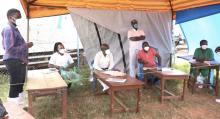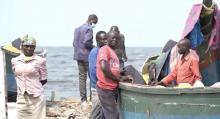WHO supports the Government of Uganda to rapidly respond to COVID–19 at Kasensero Landing Site
Kampala, 2 September 2020:- Kasensero landing site located on the shores of Lake Victoria in Kyoteera district in southern Uganda has always made public health news. It is known as the “birth” place of HIV/AIDS in Uganda because the first confirmed cases were recorded from this area.
Its social life has also been known to fuel health problems putting the landing site under yet more spotlight. Kasensero with a population of approximately 15,000 people is also a significant Point of Entry through which traders, fishermen and travellers from East African countries access Uganda.
For the on-going COVID-19 pandemic, the landing site was once again under scrutiny at one time as it recorded considerably more cases compared to other parts of the country. At that time, an average of four people per day were being confirmed for COVID-19 which was worrying given its geographical size, settlement patterns and the number of people resident in the area.
“Big crowds engaging in alcohol drinking and interacting with commercial sex workers, congested households, produce and fish markets was a very alarming and worrying situation,” said Dr. Muwanga Edward, the Kyotera District Health Officer. The influx of traders and travelers entering the country from other countries with potentially high infection rates made the situation very critical.
This worrying health trend caught the attention of the Ministry of Health and WHO and teams were immediately dispatched to Kyoteera district to help address the situation. Their brief was to quickly come up with effective interventions to stop the spread of the disease in the entire district but Kasensero given the alarming rise of cases.
There was a problem though. Like many districts in the country, Kyoteera had no COVID-19 response plan. While this had to be the starting point, the district and national response team had to rush to Kasensero to put some interventions in place however rudimentary. After putting out the fire in Kasensero, the officers assisted the district to draft a robust COVID-19 response plan.
“We engaged the leadership on two fronts, mass testing and community engagement to change people’s attitudes towards the pandemic,” said Mr Kintu Emax the Kyotera District Health Educator adding that “we relied on the Village Health Teams (VHTs), security and community leaders to reach almost every household”.
Under the leadership of Mr Moses Besige, the town mayor, a local task force was immediately put in place to oversee implementation of the Presidential directives and Ministry of Health guidelines on the prevention and control of COVID-19. Hand hygiene and physical distancing were given priority because of the relatively large population in a small area that was experiencing unprecedented flooding at the same time.
COVID-19 testing was brought near to the people with a sample collection team stationed permanently in the community. The mayor provided a tent and demarcated an area where the testing was carried out. Stakeholders such as local council leaders, commercial sex workers, fish trucks drivers and their leaders were identified and requested to be part of the response team.
They were specifically requested to encourage their members to comply with the set preventive guidelines and community testing.
The inspirational town Mayor worked with the security forces and strict movement restrictions were imposed requiring fishermen and travellers from neighbouring countries to be tested before granting them entry into the country. Roadblocks were set up on all roads at which all travellers were screened and also required to wash hands. Luckily, Kasensero is kind of a peninsular so enforcing this travel requirement was rather easy.
Fishermen on arrival at Kasensero Landing site waiting for guidance from the COVID-19 response team before fully disembarking.
Besides, all fishermen, especially from neighbouring countries, were restricted from disembarking their boats as a way of limiting interactions with the local community. Meanwhile, the dependable Village Health Teams were traversing the community preaching COVID-19 messages, distributing IEC materials, supporting behaviour change and counselling the affected among other duties.
Kasensero was also awash with rumours given the beehive activities that were being implemented and the several strange faces people encountered daily. The town mayor was again at his best bursting or countering the rumours at every opportunity and in this, he was aided by the local community radio that was used to the maximum.
“I was able with the help of security to curb the rising rumour-mongering which was perpetuated by one community member recently release from institutional quarantine. We educated him about corona and cautioned him to stop the rumor because it can cause social disruption”, said Mayor Besige Moses.
The community radio was also effectively used to sensitize and remind the community to follow the Presidential directives and the Ministry of Health guidelines. This, according to the mayor greatly contributed to the community compliance and eventual reduction in the confirmed cases.
With the help of effective community sensitization and mobilization, health workers managed to collect and test samples from the community and achieved coverage of 95% in this community. Luckily, at the time writing, no positive cases had been detected in the last four weeks which is attributed to the excellent work of the local task force and maximum cooperation from the community by observing and enforcing the Presidential directives and Ministry of Health guidelines.
The danger of a COVID-19 flare-up is still present in Kasensero. But with the support from WHO that has stationed a permanent team in the sub-region, community vigilance and the contribution of the ebullient town mayor, the residents of Kasensero can take a deep sigh of relief, at least for now.
Health Promotion Advisor
Tel. : +256 414 335505
Cell: +256 772 507906
Email: sensasib [at] who.int
Public Information Officer
Tel. : +256 313 335569
Cell: +256 786 497073
Email: mwebembezie [at] who.int




